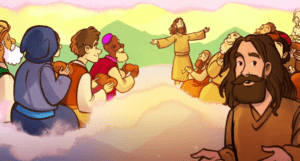
Words of Spirit and Life
What exactly did Jesus say that is so difficult for His disciples to accept? Let’s take a look back at the things that Jesus said in John 6:
- “Amen, amen, I say to you, it was not Moses who gave the bread from heaven; my Father gives you the true bread from heaven. For the bread of God is that which comes down from heaven and gives life to the world.” (John 6:32-33)
- “I am the bread of life; whoever comes to me will never hunger, and whoever believes in me will never thirst.” (John 6:35; cf. 6:48)
- “For this is the will of my Father, that everyone who sees the Son and believes in him may have eternal life, and I shall raise him [on] the last day.” (John 6:40)
- “I am the living bread that came down from heaven; whoever eats this bread will live forever; and the bread that I will give is my flesh for the life of the world.” (John 6:51)
- “Whoever eats my flesh and drinks my blood has eternal life, and I will raise him on the last day. For my flesh is true food, and my blood is true drink. Whoever eats my flesh and drinks my blood remains in me and I in him. Just as the living Father sent me and I have life because of the Father, so also the one who feeds on me will have life because of me.” (John 6:54-57)
What were the implications of the things that Jesus said?
- By calling God His Father and by saying that He had come down from heaven, Jesus was claiming to be the Son of God.
- By saying that anyone who believes in Him may have eternal life, Jesus was claiming to be the means of salvation of mankind. But at this point in time, many of Jesus’ disciples had a hard time thinking beyond the Old Law as the means of salvation.
- By saying that whoever eats His flesh and drinks His blood has eternal life, Jesus was not making sense to His disciples for how can they possibly eat His flesh and drink His blood? Because of this, many left Jesus.
Therefore, Jesus asked them if they would like to see him ascend into heaven, in order to prove to them that what He was saying is true. Jesus added: “It is the spirit that gives life, while the flesh is of no avail. The words I have spoken to you are spirit and life.” (John 6:63) The things that Jesus said are not of this world, but of heaven, and Jesus was revealing these things to His disciples for the first time. Furthermore, it is total faith in the words of Christ that gives eternal life, rather than the things of this world.
What is the most important thing to you at this time – the things of this world or the things of heaven? Worldly things are not merely material things like money or possessions. Worldly things also include intangible things like ambition, power, the “perfect” body, etc. Can these things give eternal life? Rather, it is the things of heaven like faith and hope in Christ, love of God and neighbor which lead us to eternal life.
Jesus is the ultimate revelation of God. Jesus used the words “I AM” seven times in John’s Gospel – the same words which God used to reveal himself to Moses in the Book of Exodus (cf. Exodus 3:14). Jesus said:
- “I AM the Bread of Life” (John 6:48)
- “I AM the Light of the World” (John 8:12)
- “I AM the Door of the Sheep” (John 10:7)
- “I AM the Good Shepherd” (John 10:14)
- “I AM the Resurrection and the Life” (John 11:25)
- “I AM the Way, the Truth and the Life” (John 14:6)
- “I AM the Vine” (John 15:5)
Today, many people who regard themselves as having faith in Christ do not, in fact, totally accept the words of Christ; but instead of leaving Jesus like the disciples in the Gospels, they find ways to interpret Jesus’ words into something that suit their own ideas and preferences.
The words of Christ in the Bread of Life discourse were fulfilled at the Last Supper when Jesus gave His own flesh and blood in the Eucharist, for His disciples to eat and drink. Jesus said: “Take and eat; this is my body” (Matthew 26:26; cf. Mark 14:22, Luke 22:19) and “Drink from it, all of you, for this is my blood of the covenant, which will be shed on behalf of many for the forgiveness of sins.” (Matthew 26:27-28; cf. Mark 14:24, Luke 22:20) Back then, Jesus instituted the Eucharist at the Last Supper in order to give His own flesh and blood to His disciples; even now, He still gives His flesh and blood to His disciples, and eternal life to those who believe.